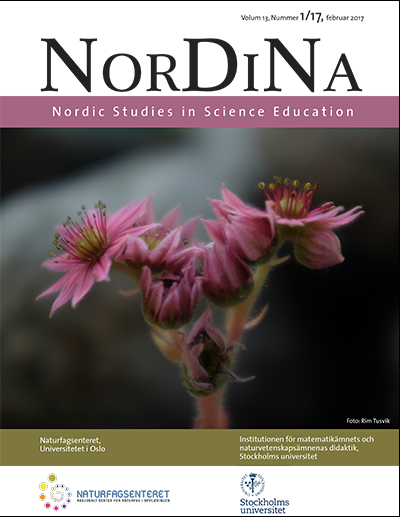Åtte naturfaglæreres forståelse av og erfaringer med utforskende arbeidsmåter og Forskerspiren ni år etter innføring av den norske nasjonale læreplanen Kunnskapsløftet (LK-06).
DOI:
https://doi.org/10.5617/nordina.3452Keywords:
Science education, IBSE, Inquiry based science teaching, LK-06, Forskerspiren,Abstract
Improved learning by implementation of inquiry-based science education (IBSE) has been well documented. Eight Norwegian secondary school teachers associated the term IBSE with problem solving, good student dialogues, experiments and practical work. They rarely implemented “full” IBSE in their teaching practices even though this is well anchored in the Norwegian national curriculum. The teachers had experienced that IBSE led to an increased interest, motivation and curiosity for science learning, and explicit scaffolding and guidance were regarded as important to obtain good learning processes. Limiting factors for implementation of IBSE were time available, organization of teaching hours, class room facilities and the number of students in the class. IBSE activities were in particular valued as important to stimulate science-based discussions in the classroom. In order to promote and increase the implementation of IBSE in secondary school science teaching, two strategies might be good to pursue: increased time resources to teach science in the Norwegian school and introduction of IBSE-focused teacher training programs.
Downloads
Published
Issue
Section
License
Authors who publish with this journal agree to the following terms:- Authors retain copyright and grant the journal right of first publication with the work simultaneously licensed under a Creative Commons Attribution License that allows others to share the work with an acknowledgement of the work's authorship and initial publication in this journal.
- Authors are able to enter into separate, additional contractual arrangements for the non-exclusive distribution of the journal's published version of the work (e.g., post it to an institutional repository or publish it in a book), with an acknowledgement of its initial publication in this journal.
- Authors are permitted and encouraged to post their work online (e.g., in institutional repositories or on their website) prior to and during the submission process, as it can lead to productive exchanges, as well as earlier and greater citation of published work (See The Effect of Open Access).


